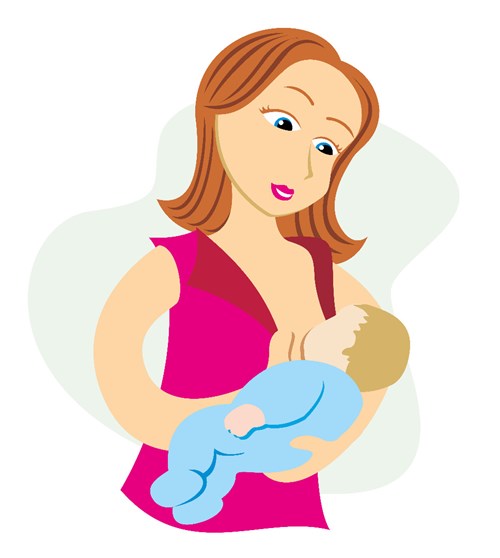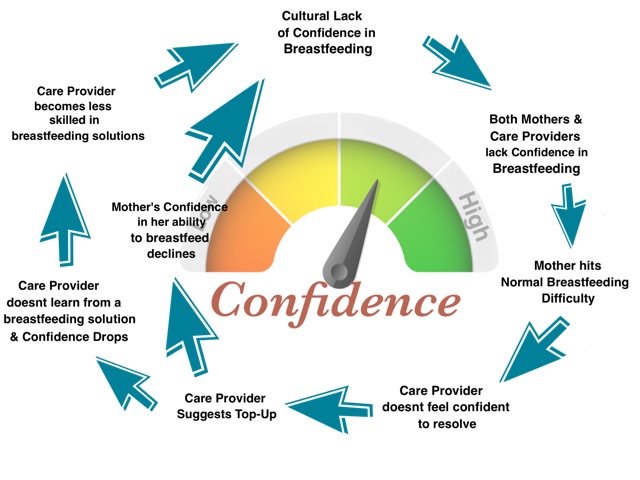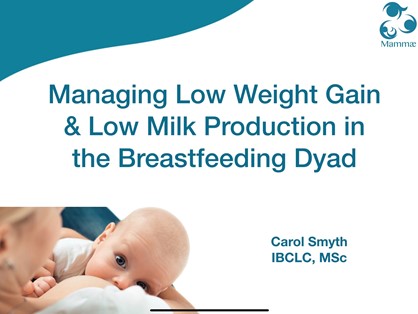I am an IBCLC (International Board Certified Lactation Consultant) in private practice in Northern Ireland and a La Leche League Leader with La Leche League of Ireland
Breastfeeding, Confidence and the Top-Up Culture
We have a top-up culture within a lot of breastfeeding "support" in Northern Ireland. Too often I hear top-ups of formula suggested for virtually any issue that a mother cares to mention in the early days of breastfeeding, and unfortunately many times the suggestion comes from a health care provider (HCP).
Baby feeding frequently - try a top-up after breastfeeds
Slow weight gain - give a top-up after feeds
High weight gain but baby seems colicky - maybe he's hungry and needs a top-up
Baby unsettled in the evenings - maybe he needs a top-up
Baby doesn't settle in his cot at night - give him a wee top-up after the bed time feed to help him sleep
Etc etc etc.
As you can see, the situations where top-ups are suggested are varied and often contradict each other, so I wanted to look at little at what is actually going on when top ups are suggested.

There are certainly situations when the supplementation of a baby is indicated. If a baby is not latching well and not drinking well then supplementation is needed. If a baby is early and isn't able to create good vacuum, or if a baby of any age has a dysfunctional suck supplementation may be needed. If a newborn is very sleepy and not demanding frequent feeds, supplementation may be needed, and if a baby at any age is not gaining weight appropriately supplementation may be needed. Supplementation does not mean formula, however. Ideally supplementation means using mum's expressed Breastmilk. Supplementation is an intervention, and as with any intervention it should be defined, planned, monitored and finally removed when no longer needed. There should be a careplan which is created between the professional and the mother, balancing the mothers wishes and the needs of the baby. It should include expressing to boost mum's supply so that the supplement can be phased out as soon as possible.
Frequently, however what actually happens is that when a mum has any kind of difficulty in the early days, a top-up of formula is suggested by her care providers. Risks to mum and baby (reduction of supply, health implications to mother and baby, early weaning etc) are rarely discussed, and it is often almost a throw-away suggestion, when there is no clinical reason to suggest formula I have heard top ups suggested because a new mother is tired, for nipple pain, for when there are siblings to take care of, to "help" a baby sleep, for normal frequent feeding, for reflux and for colicky behaviour. Each of these things are difficult, and I'm not suggesting for a minute that they are not. The early days with a baby are exhausting. Adjusting to the new family dynamics and trying to meet the needs of older siblings is not easy. Difficulties with latching or weight gain or an unsettled baby are painful, both physically and emotionally. These things are overwhelming, and mothers do naturally feel overwhelmed. What a mother needs in these situations is help. If she wants to breastfeed, then she deserves help with breastfeeding. If breastfeeding is going better then it becomes easier to manage siblings. If breastfeeding is going better, it is easier to get some much needed sleep. If breastfeeding is going better the baby will be more settled. It isn't helpful to suggest top ups with formula to a mother who wants to breastfeed. Of course, some mothers want to use formula, and that is their choice. This blog is not about those mums. This blog is about the mother who wants to breastfeed exclusively, yet has top-ups suggested when there is no clinical need. For reference, the list of reasons that the World Health Organisation give for acceptable use of formula include:
- low birth weight (<1500g)
- very preterm e.g.32 weeks gestation
- metabolic disorders e.g. galactosaemia, PKU, maple syrup urine disease
- risk of hypoglycaemia (e.g. preterm, small for gestational age, intrapartum stress, maternal diabetes) - if blood glucose fails to respond to optimal breastfeeding in spite of frequent effective suckling
- HIV positive mother (if formula can be made safely)
- cytotoxic chemotherapy
- certain medications e.g iodine and psychoactive drugs
- active herpes on breast
The full WHO document on can be found in the further reading section at the bottom of the blog.
Clearly in Northern Ireland formula top-ups are suggested for a variety of reasons not included in the WHO list.
So why does it happen?
There may be many reasons why it happens, but I want to suggest that a big factor is our Cultural lack of Confidence in breastfeeding and that it creates a vicious cycle within breastfeeding support. Let's look at our breastfeeding statistics. The Infant Feeding Survey tells us that in 2010 64% of mothers in NI began breastfeeding. By 6 weeks this had dropped to 13%. We know from studies that most women who stop breastfeeding stop before they wanted to, and that leaves many women with a sense of failure. When you get most of the population not succeeding (in their eyes) at breastfeeding it feeds into an idea that breastmilk is not enough, or that they were not enough. This idea ripples out through those in contact with that woman.
The statistics in 2010 are actually high for Northern Ireland. In 1990 (one birthing generation ago) the number of women who started breastfeeding was 36%. The generation who gave birth in the 1970s virtually all formula fed. Those that did breastfeed were extremely lucky if they managed to create a full milk supply since babies were removed to a nursery and feeds were timed. This means that for most of us, we do not have a chain of breastfeeding behind us through our female line. The line of breastfeeding mothers was broken and most of us have at least 1 generation where the children were formula fed. For many there may be 2 or 3 generations who formula fed. This leads to a lack of understanding of breastfeeding and of biologically normal baby behaviour. Frequent feeding is normal behaviour. Wanting to be held constantly is normal behaviour. Feeding 3-4 hrly (common with formula fed babies ) is not normal behaviour. A baby sleeping alone is not normal behaviour. The lack of understanding in turn creates a cultural belief that breast milk is not enough. That babies need more in order to settle.
Our healthcare providers are part of those statistics. Statistically it is likely that many of our HVs and midwives did not breastfeed. Of those that did, statistically most fed for a very short time. They likely have a broken chain of breastfeeding behind them also, and it is likely that they also experienced problems and stopped before they wanted too.
Confidence in breastfeeding is experiential. I'm not saying that HCPs don't have breastfeeding knowledge, but for some of them I am wondering about their own sense of confidence in that knowledge. Obviously we have many fantastic HCPs who are very skilled in breastfeeding support, but not all are. Perhaps, how could they be? If you grew up in a country like Norway where 99% begin breastfeeding and 80% of babies are still breastfeeding at 6 months, your expectations about breastfeeding would be very different than here, and that applies to all our viewpoints - mothers, family members and health care staff. HCPs are in the difficult position of having responsibility for the welfare of their patients. They are responsibile for assessing growth and development and ensuring that medical issues are flagged. Consider now that you are in that position, having come from a background in N.I. and are responsible for a mother with a 2 week old who hasn't regained birth weight. You know that the baby needs more calories. Do you feel confident enough to work on a breastfeeding plan? Formula may seem like an easy alternative. It has known quantities, known calories and is easy to "administer". You may not even appreciate the risks.

The suggestion of top-ups undermines mothers. It quietly instills in the mother an almost hypnotic suggestion that she cannot meet the needs of her baby. The mother who is already tired, worried about her baby's weight or unsettled behaviour and seeking reassurance and help. Once the top-up has been given, the mother's supply starts dropping and now she really feels she needs the topup and often a cycle of ever decreasing breastfeeding ensues. The woman grieves her lost breastfeeding experience.
Let me clarify a few very important things. Breastmilk is perfectly designed for your baby. Your milk is exactly what your baby needs. There is no need for a modified cows milk product in order to add "something" to help our babies develop or settle. If your baby isn't settling, or wants to feed frequently consider whether what you are experiencing is actually normal. If you are worrying about having enough milk remember that it is biologically normal to produce enough milk for our babies. It is not normal to have insufficient milk or for our milk to not meet the needs of our baby. When you hear your parents/grandparents talk about how they didn't have enough milk, remember that they were never given a real chance to breastfeed. They had their babies when they perhaps a "feed" was considered a few minutes (maybe even 3-4 minutes in the first few days). The basics of demand and supply were never considered. Remember that these were the days that women were advised to "toughen up" their nipples prior to birth, and the basics of latching were poorly understood.
Women's bodies are designed to grow, birth and feed their babies. We grow entire human beings from one cell, and then birth that baby human. Contemplate the creative processes involved in that, and what exactly happens in our bodies. It doesn't make any sense that our body would be able to do that, but not be able to feed that child. Pregnancy, birth and breastfeeding are all one event evolutionarily speaking. They are about producing an offspring. Most of us probably played mothering with our dolls as young children, just as we watch our children do now. I suspect that many of us just expected that one day we would grow up and have a baby. When you played, how did you feed that baby? Did you use your chest or a bottle? It is a cultural issue that we doubt that we will be able to feed that baby, not a biological one. The human race wouldn't have got this far if women could create the baby, birth him but not be able to feed and grow him.
If you are having top-ups suggested and you want to breastfeed - ask your HCP if there is an breastfeedkng alternative solution. If you aren't happy with the answer search out a lactation consultant (IBCLC) or breastfeeding counsellor who believes in breasfeeding. One who is confident in breastfeeding, in breastmilk and knows that you can feed your baby. Break the cycle and find someone who will help you meet your breastfeeding goals. Resolving the issue through a breastfeeding solution increases your own confidence in yourself and your mothering, and not only that, confidence is contagious. As more HCPs see breastfeeding resolutions, their confidence grows as well, and little by little our culture changes.
Top ups aren't the answer to normal early day breastfeeding difficulties. Breastfeeding Problems have Breastfeeding Solutions. You and your baby deserve a breastfeeding solution.
If you have any questions about a consultation or would like to arrange to meet, please get in touch.
Low Weight Gain/Low Milk Supply Webinar
This webinar is a recording of an online seminar aimed at breastfeeding professionals and those working in breastfeeding support to help manage low weight gain and low milk production.

Further Reading
WHO document - "Acceptable Medical Reasons for use of Breast-milk Substitutes". http://apps.who.int/iris/bitstream/10665/69938/1/WHO_FCH_CAH_09.01_eng.pdf
Developed Countries Breastfeeding Scorecard http://www.savethechildren.ca/document.doc?id=195 page 45
UK Infant Feeding Survey 2010 http://www.hscic.gov.uk/catalogue/PUB08694/Infant-Feeding-Survey-2010-Consolidated-Report.pdf
Important Information
All material on this website is provided for educational purposes only. Online information cannot replace an in-person consultation with a qualified, independent International Board Certified Lactation Consultant (IBCLC) or your health care provider. If you are concerned about your health, or that of your child, consult with your health care provider regarding the advisability of any opinions or recommendations with respect to your individual situation.
